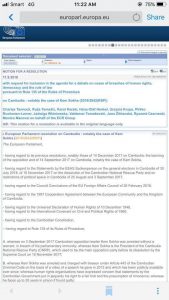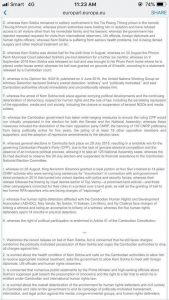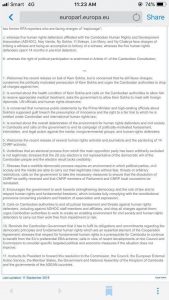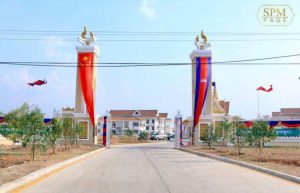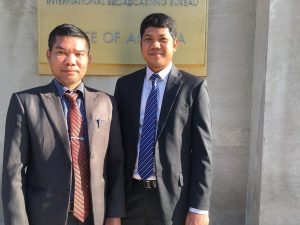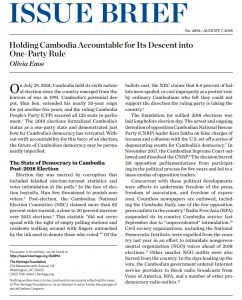Official reference source: European Parliament
| European Parliament resolution on Cambodia, notably the case of Kem Sokha (2018/2842(RSP)) | ||
| The European Parliament,
– having regard to its previous resolutions on Cambodia, in particular those of 14 September 2017(1) and 14 December 2017(2), – having regard to the Council conclusions on Cambodia of 26 February 2018, – having regard to the statement by the spokesperson of the European External Action Service (EEAS) of 30 July 2018 on the general elections in Cambodia, – having regard to the evaluation mission of the Commission and the EEAS to Cambodia of 5 to 11 July 2018, – having regard to the 2008 EU Guidelines on Human Rights Defenders, – having regard to the statement by the spokesperson of the EEAS of 16 November 2017 on the dissolution of the Cambodian National Rescue Party, – having regard to the 1997 Cooperation Agreement between the European Community and the Kingdom of Cambodia, – having regard to the local EU statement of 22 February 2017 on the political situation in Cambodia, and the statements by the spokesperson of the EU Delegation of 25 August 2017 and 3 September 2017 on restrictions of political space in Cambodia, – having regard to UN Human Rights Council Resolution 36/32 of 29 September 2017 and the Report of the Secretary-General of 2 February 2018, – having regard to the report of the Committee on the Human Rights of Parliamentarians and the decisions of the Governing Council of the Inter-Parliamentary Union of March 2018, – having regard to UN General Assembly Resolution A/RES/53/144 of 8 March 1999 on the right and responsibility of individuals, groups and organs of society to promote and protect universally recognised human rights and fundamental freedoms, – having regard to the 1991 Paris Peace Accords, in which a commitment to uphold human rights and fundamental freedoms in Cambodia, including on the part of international signatories, is enshrined in Article 15, – having regard to the International Labour Organisation Convention on Freedom of Association and Protection of the Right to Organise, – having regard to the Cambodian Constitution, in particular Article 41 thereof, in which the rights and freedoms of expression and assembly are enshrined, Article 35 on the right to political participation and Article 80 on parliamentary immunity, – having regard to the Universal Declaration of Human Rights of 10 December 1948, – having regard to the International Covenant on Civil and Political Rights of 1966, – having regard to Rules 135(5) and 123(4) of its Rules of Procedure, A. whereas on 3 September 2017, Kem Sokha, the President of the Cambodia National Rescue Party (CNRP), was arrested, and whereas on 16 November 2017, the Supreme Court announced the dissolution of the CNRP, at the end of a one-day hearing; whereas the Supreme Court has also banned 118 CNRP politicians from being politically active for five years; B. whereas the ruling Cambodian People’s Party (CPP) obtained 100 % of the contested seats in the National Assembly election held on 29 July 2018 and in the Senate election held on 25 February 2018; C. whereas the right to political participation is enshrined in Article 35 of the Cambodian Constitution; whereas the amended 2017 Law on Political Parties includes numerous restrictions on the participation of opposition parties, including the dissolution of parties if its leaders have a criminal record; D. whereas the 2018 elections in Cambodia were de facto non-competitive and failed to meet minimum international standards for democratic elections; whereas the European Union and the United States of America suspended their financial assistance to the Cambodian National Election Committee and declined to observe the elections; E. whereas the decision to dissolve the CNRP was a significant step towards the creation of an authoritarian state; whereas the political structure of Cambodia can no longer be considered a democracy; F. whereas the Cambodian Government took wide-ranging measures to ensure that the ruling CPP would run virtually unopposed in the elections for both the Senate and the National Assembly; G. whereas, following his arrest on 3 September 2017, Kem Sokha was charged with treason under Article 443 of the Cambodian Criminal Code, despite his parliamentary immunity; whereas statements by the Cambodian Government jeopardised his right to a fair trial and the presumption of innocence; whereas he faces up to 30 years in prison if found guilty; whereas the President of the Court, Dith Munty, is a member of the standing committee of the ruling party; H. whereas on 28 August 2018, the Cambodian authorities released 14 members of the CNRP after they had received a royal pardon; whereas this pardon is linked to the releases granted to half a dozen activists and journalists; I. whereas Kem Sokha was detained without trial for more than one year; whereas the UN Working Group on Arbitrary Detention declared Mr Sokha’s pre-trial detention to be ‘arbitrary’ and ‘politically motivated’; whereas he was released on bail on 10 September 2018; whereas he is unable to leave the vicinity of his house and is not allowed to communicate with other members of the opposition or the media; J. whereas the arrest and detention of Kem Sokha occurred amid widespread and systematic repression of political and electoral rights in Cambodia; whereas there has been a steady increase in the number of cases of arrest and detention of members of the political opposition and political commentators; whereas the previous President of the CNRP, Sam Rainsy, was convicted of criminal defamation and now lives in exile; K. whereas the Cambodian authorities have also cracked down on journalists and reporters covering the attacks on the opposition parties; whereas 69‑year‑old award-winning filmmaker James Ricketson is one of the victims of these attacks on the media; whereas Mr Ricketson was arrested for flying a drone over an opposition party rally in June 2017; whereas Mr Ricketson has been sentenced to six years in prison in the capital, Phnom Penh, on charges of espionage; L. whereas there has been a severe crackdown on the independent media; whereas social media networks have also come under attack; whereas in May, the Government issued a regulation restricting the rights to freedom of expression, press and publication and empowering the Government to police social media networks to uncover and silence online dissent in Cambodia; M. whereas trade unionists, human rights activists and civil society organisations are operating in an increasingly restricted space in Cambodia and face harassment, acts of intimidation and arbitrary arrest; whereas the 2015 amended Law on Association and Non-Governmental Organisations (LANGO) severely restricts freedom of association and expression, including by establishing government control and censorship over the work of NGOs; whereas the Trade Union Law restricts freedom of association and creates unnecessary obstacles and burdens in relation to registration procedures and the operations of trade unions; N. whereas five human rights defenders affiliated with the Cambodian Human Rights and Development Association (ADHOC), Nay Vanda, Ny Sokha, Yi Soksan, Lim Mony, and Ny Chakrya, face charges of bribing a witness and being an accomplice to bribery of a witness; whereas the five human rights defenders spent 14 months in pre-trial detention before their release on bail; O. whereas Cambodia benefits from the most favourable regime available under the EU’s Generalised Scheme of Preferences (GSP), namely the Everything But Arms (EBA) scheme; whereas the EU has allocated up to EUR 410 million to Cambodia for development cooperation for the financial period 2014-2020, of which EUR 10 million is for supporting the electoral reform process in Cambodia and is currently suspended; P. whereas the UN Secretary‑General recalled in his July statement that an inclusive and pluralistic political process remains essential for safeguarding the progress made by Cambodia in consolidating peace; Q. whereas conflicts over sugar plantations have not yet been resolved; whereas there is continuing concern about evictions from land, persistent impunity for such acts and the dire situation of the affected communities; whereas the Government of Cambodia has not signed up to the EU Terms of Reference for the Sugar Cane Audit Process; 1. Notes that Kem Sokha was released from prison on bail under strict conditions; denounces the fact that Kem Sokha has been placed under house arrest; calls for all charges against Kem Sokha to be dropped and for his immediate and full release; calls, furthermore, for other politically motivated charges and rulings against opposition politicians, including Sam Rainsy, to be dropped immediately; 2. Is worried about the condition of Kem Sokha’s health, and calls on the Cambodian authorities to allow him to receive appropriate medical treatment; asks the Government to allow Kem Sokha to meet foreign diplomats, UN officials and human rights observers; 3. Expresses its conviction that the elections in Cambodia cannot be considered to be free and fair; expresses serious concerns at the conduct and results of the 2018 elections in Cambodia, which failed to produce a credible process and were widely condemned by the international community; 4. Calls on the Cambodian Government to work towards strengthening democracy and the rule of law and to respect human rights and fundamental freedoms, which includes fully complying with the constitutional provisions on pluralism and freedom of association and expression; calls, furthermore, on the Cambodian Government to repeal all recent amendments to the Constitution, the Penal Code, the Law on Political Parties, the Trade Union Law, the Law on NGOs and all other pieces of legislation limiting freedom of speech and political freedoms that are not fully in line with Cambodia’s obligations and international standards; 5. Stresses that a credible democratic process requires an environment in which political parties, civil society and the media are able to carry out their legitimate roles without fear, threats or arbitrary restrictions; calls on the Government to take the necessary measures to ensure that the dissolution of CNRP is swiftly reversed; 6. Reiterates its call on the Cambodian Government to put an end to all forms of harassment, abuse and politically motivated criminal charges against members of the political opposition, human rights defenders, trade unionists and labour rights advocates, land rights and other civil society activists, and journalists, among others; calls on the Government of Cambodia to release, without delay, all citizens who have been detained for exercising their human rights, including James Ricketson, and to drop all charges against them; 7. Supports the decision to suspend EU electoral support to Cambodia; recalls the national and international obligations in relation to democratic principles and fundamental human rights to which Cambodia has committed itself; urges the Cambodian Government to engage in reforms in order to advance democracy and apply internationally recognised minimum standards for future electoral processes, including the organisation of multiparty, free and fair elections, the establishment of a genuinely independent National Election Committee and the involvement of NGOs and the independent media in election monitoring and reporting; 8. Reminds the Cambodian Government that it must fulfil its obligations and commitments in relation to the democratic principles and fundamental human rights, which are an essential component of the EU-Cambodia Cooperation Agreement and the conditions under EBA; 9. Welcomes the recent EU EBA fact‑finding mission to Cambodia and invites the Commission to report the conclusions to Parliament as soon as possible; calls on the Commission to consider possible consequences in the context of the trade preferences Cambodia enjoys, including launching an investigation under the mechanisms provided for in the framework of EBA; 10. Calls on the EEAS and the Commission to compile a list of individuals responsible for the dissolution of the opposition and other serious human rights violations in Cambodia with a view to imposing possible visa restrictions and asset freezes on them; 11. Calls on the Vice‑President of the Commission / High Representative of the Union for Foreign Affairs and Security Policy to closely monitor the situation in Cambodia; calls on the EEAS and the Member States to take action and lead the efforts at the forthcoming 39th session of the UN Human Rights Council towards the adoption of a strong resolution addressing the human rights situation in Cambodia; 12. Calls on the Cambodian Government to renew the Memorandum of Understanding (MoU) with the UN Office of the High Commissioner for Human Rights (OHCHR) in Cambodia upon its expiry on 31 December 2018; 13. Instructs its President to forward this resolution to the Council, the Commission, the Vice-President of the Commission / High Representative of the Union for Foreign Affairs and Security Policy, the European External Action Service, the Secretary-General of ASEAN, the governments and parliaments of the Member States and the Government and National Assembly of Cambodia. |
||

